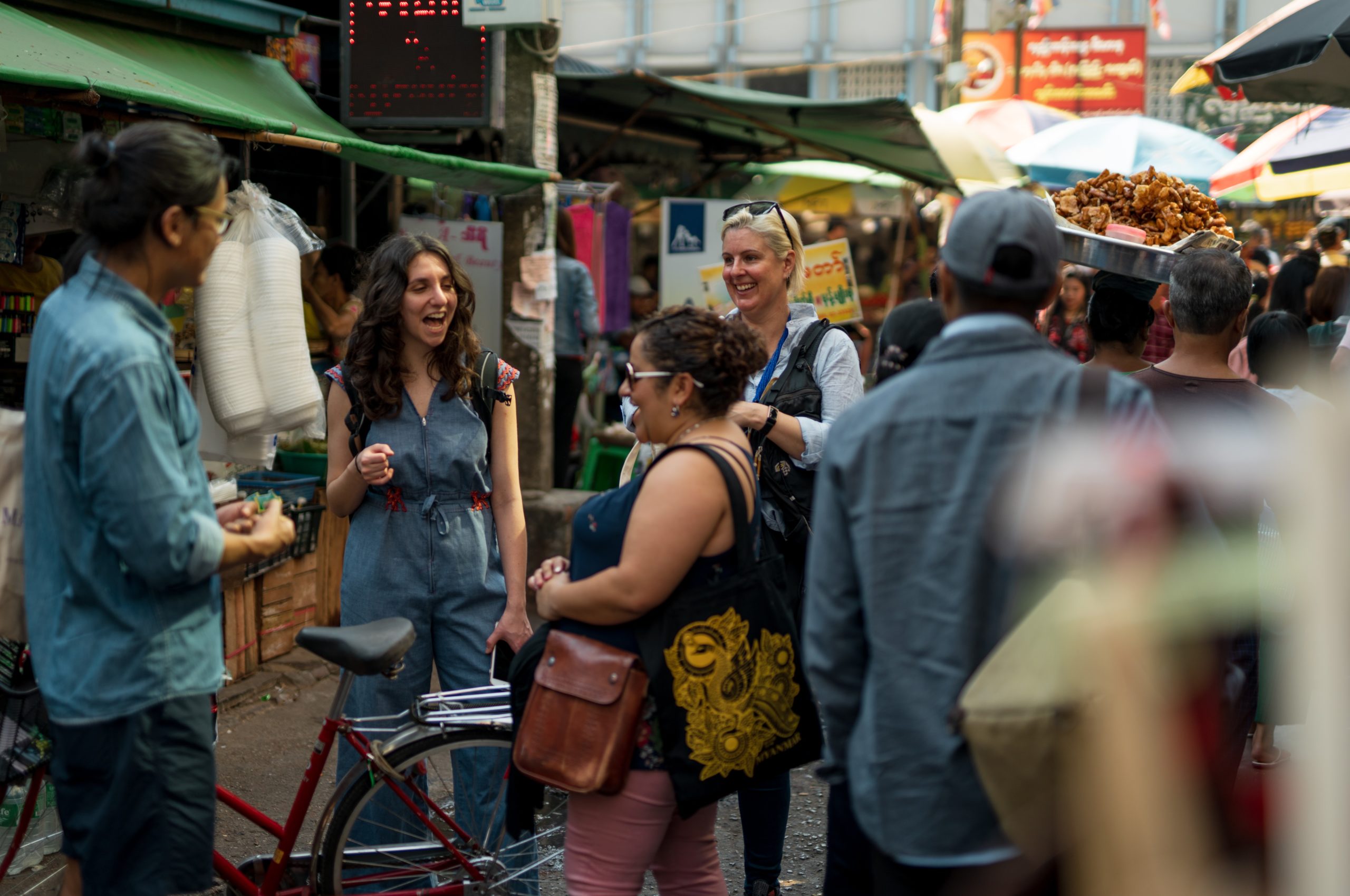The Brave Story series features different personalities that have demonstrated courage and commitment to a cause, an initiative, or movement. We share their stories hoping that their journey and the lessons they learned along the way can serve as motivation and inspiration to us all in whatever path we choose, personally or professionally.
Now it’s more important than ever to openly discuss the realities around the changing social and environmental climates. As an agency, we’re happy to highlight and share insight from a new generation of socially conscious, responsible marketers. Those willing to be a catalyst for change personally and professionally. For the last four years, Bex Shapiro has helped the world’s largest adventure travel company focus on inclusivity through marketing.
Currently the Global Social Media Manager for Intrepid Travel, her previous roles editing the blog and growing their creator community helped her focus on humanizing the people behind the brand. Bex shares her perspective on the evolution of social media and its intersection with social justice. She urges brands to avoid “wokewashing” and unpacks her perception of call-out culture and the fear of getting called out.
These are the important conversations we want to have with forward-facing brands and marketing professionals. Creating real and long-lasting change means not only doing the work but consistently checking that the work remains aligned with the mission.
Tell us a bit about yourself and the work you do.
I’m Bex and I’m a storyteller. I’m a proud Londoner based in Vancouver, Canada, and freelance writer – published in The Guardian, VICE, ELLE, and The Huffington Post – and a Climate Reality Leader, advocating for climate action.
I view my work with Intrepid as communicating the beauty and importance of travel through the lens of people and their stories. Telling the story of a female tour guide in India taking on a career deemed unsuitable for a woman in a male-dominated society. Sharing the story of a single mom in Canada booking a trip to celebrate freedom from cancer, discovering how transformative adventure travel can be. And recounting the obstacles of a widow and a widower from opposite corners of the globe, who meet on an Intrepid trip in Southeast Asia, fall in love, and are kept from seeing each other because of the pandemic.
My work also oversees the communication of our social impact initiatives. As the world’s largest travel B Corp, Intrepid Travel has an official certification that it uses business as a force for good. In other words, it keeps sustainability, inclusivity, and transparency at the forefront of all decision-making. I channel this mindset into our public-facing communications and content, ensuring they advocate for a greener tourism industry (campaigning for other companies to decarbonise, advising on how to travel with less plastic) as well as a more diverse industry (featuring everyone from Black creators working towards greater inclusivity in outdoor spaces to Muslim travellers taking the plunge and booking that first-ever solo trip).
Last year there was a lot of fear around travel brands getting called out for not having a diverse staff and homogenized content. What challenges are marketers facing now trying to balance client/brand demands with social issues and personal beliefs?
Travel brands were called out – and rightly so! Travel should be one of the most diverse and inclusive industries in the world – it’s responsible for one in 10 jobs worldwide, and it literally cannot function without different cultures and perspectives.
Yet last year, there were a lot of brands so fixated on saying the right thing that it may have taken time away from actually doing the right thing. The challenges marketers are facing right now therefore is translating the words and commitments into action. And doing so with fewer resources than ever, thanks to the ongoing devastation of the pandemic.
Moving forwards, avoiding “wokewashing” in addition to avoiding “greenwashing” will be key. Today’s consumers are demanding more from brands, travel, or otherwise. And a strong commitment to both inclusivity and sustainability have moved from “nice-to-have” to essential. Marketing teams need to rise to the occasion, but so do every other type of team. That’s how the real impact happens, with it being every person’s responsibility.
How do you manage the fear around being called out publicly for racism? Personally and professionally?
If the work is being done internally, concerns about being called out should be very much secondary. Of course, I care about the reputation of the brand I work for (my role is part of the PR team!), but I care more that it’s doing the right thing. And that it’s doing the right thing for the right reasons, and not out of fear.
I think you only really have something to fear if you’re NOT meaningfully committed to anti-racism and inclusivity, whether as a human or as a brand. Of course, this is all a journey, but if you’re committed to that journey and honest about it, then I believe that does come across.
When the brand conversations regarding Black Lives Matter were at their peak in June 2020, we thought long and hard about the best way to respond, pausing all other content in a 10-day time period. The commitments we made then, which I’ll detail further in this interview, were a result of lengthy internal conversations and commitments to inclusivity. I was extremely involved in every aspect of this process and, honestly, I was nervous before posting about it on our social channels. But our initial support for the Black Lives Matter movement and our subsequent commitments to anti-racism and anti-oppression had an incredibly positive reception. Not only was it gratifying to see this content become some of our most-interacted-with of the entire year, but it really showed that a forward-facing brand in today’s world has a duty to use its voice for good. And that doing so yields authentic advocacy.
Let’s change the conversation from feeling fear of being called out to asking whether we’re doing enough to be the change we want to see in the world.
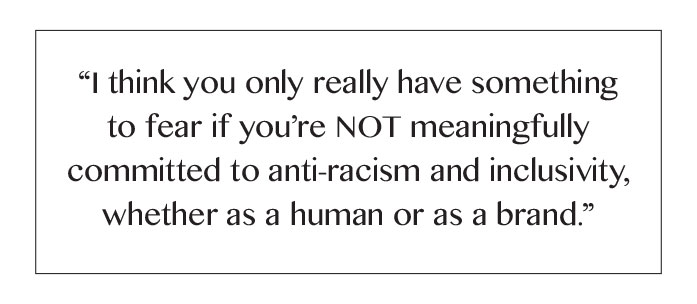
From a personal perspective, how do you see social media changing and evolving to adhere to the current climate?
The social evolutions I’m observing – and expect to continue to see – are twofold. First, there’s a greater demand for more authentic, genuine content and less polished, curated content. The pandemic has been a primary driver of this trend. There’s also a greater demand for more shareable, educational content. The increased prominence of the Black Lives Matter movement has been a primary driver of this trend.
Personally, I welcome both trends because social media absolutely should be a place for meaningful connections and mindful learning. I believe the brands and the creators that manage to embrace both trends – while keeping community first – will create the most engaging and impactful content moving forward.
Some of my favourite follows? The @intersectionalenvironmentalist platform, started by @greengirlleah, is doing an inspiring job harnessing the power of like-minded activists and using social media as a force for good. Two brands excelling at humanising people and products are @glossier and @girlfriend. Something these accounts have in common is that inclusivity is built into the very fabric of their content and communications. It isn’t an afterthought.
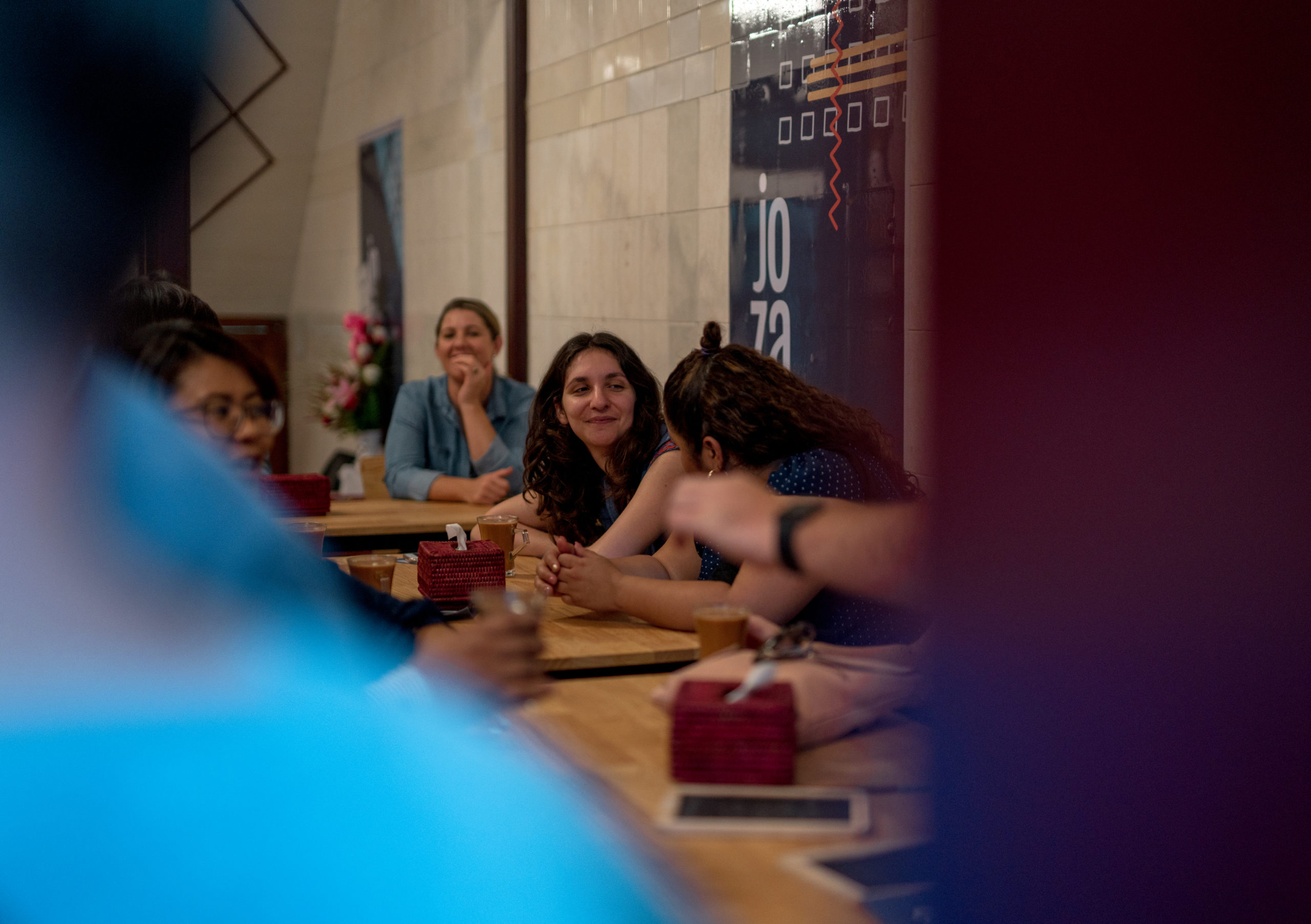
What internal changes has Intrepid made in the last year to become a more inclusive brand and company?
Our internal changes and commitments have fallen under 4 main categories:
- Introducing mandatory anti-racism training for all team members
- Amplifying Black, Indigenous, and People of Colour (BIPOC) voices in our marketing
- Acknowledging the intersection of climate justice and social justice
- Launching our “Innovate” Reconciliation Action Plan
Although these commitments were made in June, some are building on work that we’ve been doing for over 30 years. Others are still a work in progress and paving the path for much more. For instance, we turned our planned one-off anti-racism training into a three-part series, recognising how complex the topic is and how continuous the conversations need to be.
It’s been great to have these initiatives featured in publications such as Conde Nast Traveler and Forbes, but it’s more powerful and meaningful to see the internal conversations they’ve sparked and the internal will that exists to take them further. Changes aiming to create more inclusivity need to be implemented because the company wants to be better and to do better, not because the company wants a “PR win.”
It’s also worth pointing out that for internal changes to be long-lasting, they need to come from the top-down AND the bottom up. They can’t just come from communications professionals, they need buy-in from the executive team and even junior team members. And they need to be properly resourced, not relegated to siloed, unpaid committees.
What are some suggestions for the new generation of socially responsible marketers in travel? How can they help support and cultivate an inclusive brand?
Moving forwards, I think the greatest challenge – and opportunity – is looking more holistically at social impact. The last year showed that even brands committed to sustainability can miss the mark when it comes to DEI (e.g. Patagonia). You can’t pick and choose where to care. The companies that are genuinely and transparently dedicated to equity in every aspect of their business – and who communicate it well – will come out on top (e.g. Ben & Jerry’s, Allbirds).
The new generation of socially responsible marketers in travel therefore have an ability to hold their companies to account internally, as well as keeping track of the cultural conversation externally.
Some specific tips for cultivating an inclusive brand:
- Diversify your own network and social feeds. Follow people who look and are different to you, and ensure your professional network reflects the diversity of the world. This built-in insight into different perspectives is essential for socially responsible marketers.
- Ensure business partnering with other departments. The best marketing doesn’t exist in a silo. To meaningfully speak on social to a topic such as inclusion, it’s likely you’d need to collaborate with HR/ People teams and company executives alike. To be able to speak to other topics well in comms, you’ll need to properly connect with different teams.
- Be wary of marking milestone moments if you’re not going to commit to DEI year-round. Consider whether it’s wise to do a marketing campaign for International Women’s Day if you don’t support female empowerment all the time. Similarly, think long and hard before doing a marketing campaign for Black History Month if you don’t amplify Black voices in your content consistently.
As Global Social Media Manager to Intrepid how difficult is it to remember to post inclusive content? Are there any tips you can share to help travel brands diversify their feed?
Managing content for a large audience – social or otherwise – is a massive responsibility, as well as an exciting opportunity, so I think about it all the time!
I coined a way of assessing our inclusivity efforts that I call “the 9 square rule”. Several times a week I’ll look at our most recent 9 Instagram posts, trying to deploy the fresh eyes of someone viewing our account’s most visible content for the first time. And in those posts, if there aren’t diverse travellers evident in the feed, we’re simply not trying hard enough. Obviously, this is just a method that relates to one channel but it impresses upon the importance of inclusive content needing to be an “always-on” focus.
I have 3 tips for travel brands looking to diversify their content and feeds:
- Get buy-in from all marketers. Brand content and social media decisions are rarely made alone and so every decision-maker who impacts content (including copywriters, videographers, and designers) needs to be thinking about inclusivity. Getting buy-in will require training on unconscious bias and anti-racism, as well as clear messaging from department heads that inclusivity is a priority.
- Sort your storytelling pipeline. To tell diverse stories, you need diverse perspectives. To get diverse perspectives, you need to apply intentionality to your tactics. This means proactively fostering long-term partnerships with diverse storytellers and ideating ways of connecting with your diverse customer base to tell their stories. It means realising these focuses can’t be one-offs. And it means realising diverse teams are stronger teams.
- Remember your personal biases. Even the most well-meaning marketers make mistakes. And even those committed to creating inclusive content can forget that their background, gender, race, and age all shape their view of the world and their telling of stories. The easiest way to safeguard your content from being tone-deaf and to ensure it’s inclusive is by ensuring it’s touched and told by all sorts of people.
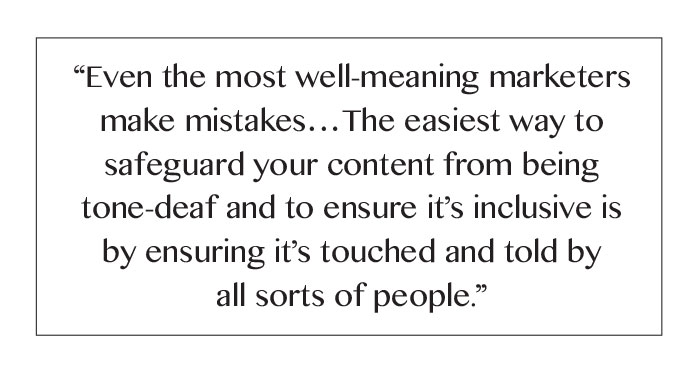
What steps are you taking personally and professionally in 2021 to be even more representative of the diverse travel community?
Professionally, I plan to keep challenging myself and Intrepid to find new ways to amplify diverse voices on our channels. Travel content is ripe for more “behind the scenes” perspectives, and there’s much more brands can be doing to humanise their supply chain and wider community via IG Lives and other video content.
It’s critical that although we want diverse narratives from diverse perspectives. That we don’t typecast particular people as having to speak for their demographic. Black travellers shouldn’t only be asked for their perspective because it represents “the Black narrative.” They should be able to share how they see fit – whether the topic is hiking or homey explorations. Similarly, a traveller with a hijab shouldn’t always have to speak to their religion in brand content – they can address whatever they want, whether it be the magic of solo travel or the joys of overcoming obstacles.
Looking at ways we can make our content more accessible, in addition to inclusive, is also an important focus for Intrepid moving forwards. For instance, adding alt text to images is a key aspect of web accessibility we haven’t done enough about yet.
I’d also like us to look into geotags and location tags, and how we can be more mindful in acknowledging the traditional owners of land through them.
Personally, my intention is to support more local and BIPOC-owned businesses through my purchasing decisions and more generally focusing on greater offline advocacy as well as online.
What does bravery mean to you?
Following your gut. Doing the right thing. Standing by your convictions. Consistently.
To me, bravery is when you can do all the above – even without the validation of data to support a cause, other people to amplify it or timeliness to trendify it.
It’s knowing that one person can change the world, but only if you treat every decision as if it can and will.
You can follow Bex on Instagram here.
Since publishing this post, Bex has left her position at Intrepid Travel to pursue a new brand marketing role in tech. Though now focused on tech as a force for good, she remains a strong advocate for inclusivity in travel and responsible storytelling.
